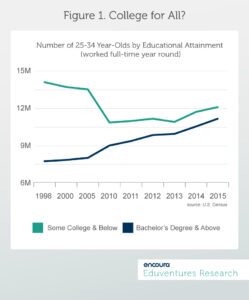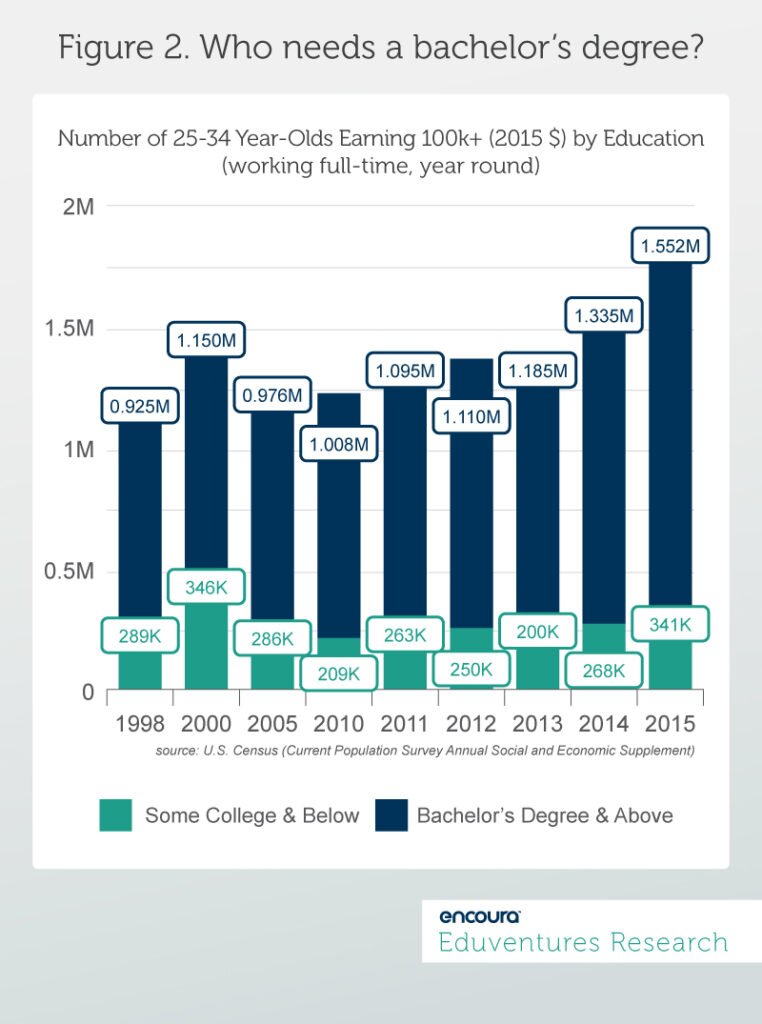Amid all the arguments about affordability, debt, and graduate employment, colleges can rely on one thing: college pays. In 2015, according to the U.S. Census and the Bureau of Labor Statistics (BLS), median earnings for people with a high school diploma as their highest educational attainment were $31,612. For people with a bachelor’s degree or higher, the median was $54,537, 73% greater. Over a lifetime, if the gauge is confined to money, and allowing for tuition, living costs, and foregone wages, it is hard to argue against the proposition that college is worth it.
But as any statistician will tell you, averages don’t tell the whole story. This Wake-Up Call considers high-earning young adults without a bachelor’s degree – people who run counter to the assumption that “college is best.” This group is quite large and growing, but too little is known about them.
First let’s set the scene.
The “college is worth it” declaration rings true but struggles to be heard above the noise. Higher education is the victim of its own success. The effort to make college more accessible has turned an elite undertaking into something commonplace—as the number of degree-holders has increased, some people worry that graduate quality must have decreased. Mass higher education is caught between cutting costs and rising tuition, resulting in larger classes and fewer full-time faculty; yet the four-year degree still takes (at least) four years to complete. Median wages are in long-term decline regardless of prior education, even if the wages of college graduates are holding up better than average. No longer the hub of disinterested knowledge, the university is now seen as riven by cultural factions. This leads to anxiety about the curriculum, variously accused of being too abstract, too vocational, too narrow, too broad, and too political.
Some critics throw up their hands and say college as we know it should be thrown out in favor of something more honest and visceral; a renewal of the college ideal by stepping off campus. The poster child for this way of thinking is the billionaire college dropout who found lectures dull and college life uninspiring, who threw caution to the wind and invested his or her last penny in a start-up that conquered the world. Peter Thiel’s annual competition to award $100,000 to a few exceptional individuals to forget college and start a company is an effort to encourage such risk-taking.
Of course, billionaire college dropouts and Thiel’s protégés are not scalable scenarios; but the question that may keep some college presidents up at night is whether, one-by-one, without media fanfare, some of the best and brightest are in fact saying no to college.
Eduventures looked at census data to see if there is any evidence for such a trend—from the Current Population Survey (CPS) Annual Social and Economic Supplement. The CPS is a joint effort between the BLS and the Census Bureau.
The data goes beyond the earnings averages cited above, capturing number of people by educational attainment and income band, so it is possible to see how many people without a degree earned above a certain wage. Comparable data goes back to 1998. To start, Figure 1 summarizes trends in educational attainment over time for selected years.



All Wake-Up Call content and Eduventures Research is available in Encoura Data Lab, a service exclusive to members of the NRCCUA.

Source: U.S. Census.
Figure 1 shows a sharp decline between 1998 and 2010 in the number of 25-34 year-olds without at least a bachelor’s degree, but the total then holds steady before edging up in 2014 and 2015. As one would expect, the “Bachelor’s & Above” total climbed throughout the period. The increased non-bachelor’s total may reflect underlying demographic growth—2009 saw the largest high school graduating class in U.S. history. A stronger economy in recent years has seen a decline in adult enrollment in higher education, which may also be part of the explanation. Equally, tuition hikes, concern about debt and a politically charged atmosphere may be keeping some prospective students away. But what about earnings? Let’s look at people aged 25-34 who worked full-time year round and earned the inflation adjusted equivalent of $100,000 or more (2015 dollars) in Figure 2.
Source: U.S. Census (Current Population Survey Annual Social and Economic Supplement)
Between 1998 and 2015, 11-14% of 25-34 year-olds with at least a bachelor’s degree earned $100k+ or equivalent, compared to only 2-3% of the “Some College & Below” group. While there is no question that the “Some College & Below” population constitutes a minority of higher earners, it is striking that this group is large in absolute terms (341,000 people in 2015), has grown in recent years and sustained share in the high teens. Even if underlying demographics explain momentum in the 25-34 year-old population as a whole, if a bachelor’s degree is assumed to be the career advancement marker in evermore professions one might expect the high-earners number for the “Some College & Below” population to be flat at best. The population sampling employed by the census may account for some of the fluctuation in the “Some College & Below” figure for high earners but it is hard to argue that this constituency is in decline. Despite all the talk of college as the ticket to the middle class, well over 300,000 25-34 year-olds in 2015 are thriving without a bachelor’s degree, at least in monetary terms. A number of important details are not clear, such as the occupations in which high-earning “Some College & Below” individuals are concentrated, and high school performance. It is important to understand the extent to which these high-flyers with limited formal education tend to be entrepreneurs, bypassing conventional hiring, or employed in professions where bachelor’s degrees are marginal. According to the BLS, there are no occupations that require less than a bachelor’s on entry with a median wage even close to $100,000. Distinguishing people with a mediocre high school record from academic stars is critical to isolate young adults who had the pick of colleges but chose a path less travelled. Perhaps some of these high earners used MOOCs or a bootcamp to get ahead? We vote for the U.S. Census to address these issues in the next CPS round. High-earning individuals without a bachelor’s degree are the other 1%—in 2015 this group made up 1.3% of all full-time working 25-34 year-olds—but are elusive and unsung compared to the super rich, even accepting that the two groups overlap. The fact that a few hundred thousand young adults have manifestly succeeded without college points to an intriguing and atypical combination of passion, grit, and circumstance that deserves to be better understood. Pursuit of a bachelor’s degree remains the most promising path for the majority of young people—and many older adults as well—but closer acquaintance with high achievers without a bachelor’s might help both fashion more mainstream degree alternatives and inject some fresh thinking into the undergraduate experience. College pays, but an improved grasp of how and why would come from better data on the star performers who have succeeded without a degree.
Never<!–- -–> Miss Your<!–- -–> Wake-Up Call
Thank you for subscribing!
Learn more about our team of expert research analysts here.
All Wake-Up Call content and Eduventures Research is available in Encoura Data Lab, a service exclusive to members of the NRCCUA.
